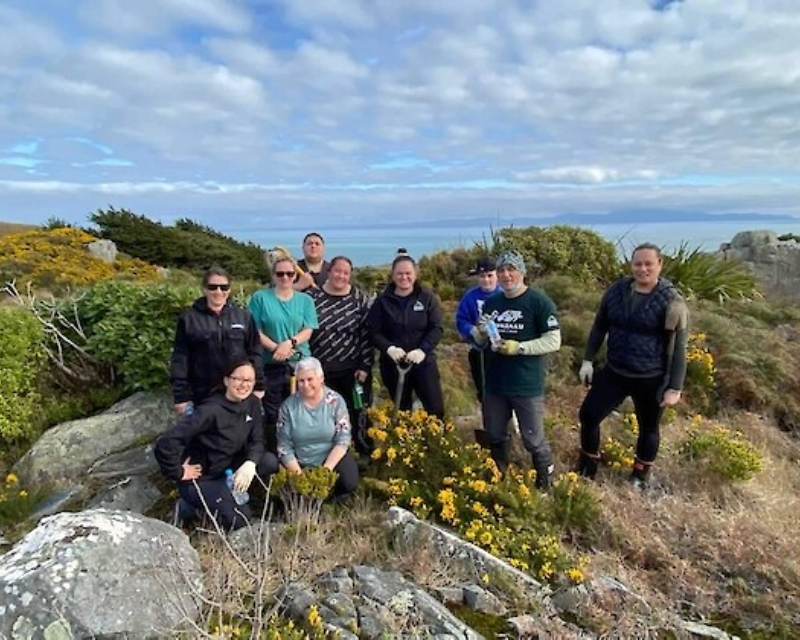Trust and its community reaping rewards from Bluff Hill’s restoration

Bluffies are getting an extra special welcome when they make their way back into their hometown.
A chorus of songbirds has only been getting louder as the Bluff Hill Motupōhue Environmental Trust has made a range of environmental gains during the past decade and a half.
The past year has been busy for the trust, which was formed in 2008 by Bluff residents concerned about the restoration of the natural environment on Motupōhue.
Possums, wilding pines and gorse have been in the Trust’s sights, says David Swann, project leader since 2021.
With many pesky possums and pest plants out of the way, the hill has been able to flourish, creating a vibrant home for many songbirds.
“We have been controlling predators at Bluff Hill Motupōhue since 2008,” David says.
“But the northern faces of the hill were never able to be tackled.
“The Jobs For Nature programme has allowed us to do that and the progress has been stunning.
“Removing a large amount of gorse has enabled native plants to flourish and more native birds have started inhabiting the hill.”
It is not only gorse that is being significantly contained at Bluff Hill Motupōhue, wilding pines are being tackled too.
“Wilding pines are the biggest challenge we face at Motupōhue,” David says.
“Native birds can’t live in a pine forest. There is nothing for them to eat.
“With funding from the Ministry of Primary Industries and Invercargill City Council, we were able to clear a huge number of wilding pines.
“While that got rid of the bulk of them, their seeds are still in the ground and ready to go.
“So, we are continuing to mop up the residual pines.
“But if we can keep tackling the pines that have cones and stop them from reproducing, we will eventually win that battle.”
Possum control is at the heart of the continued environmental gains at Bluff Hill Motupōhue.
“Each possum is eating 1-2kg of native vegetation every night, so about 1000 hectares of Bluff Hill, that is a phenomenal amount being removed if you don’t control possums."
“The trouble is they eat the new growth and possums kill big native trees.”
A major thinning of the possum populations allows new native growth to come through and for species like rātā to establish much more successfully.
Part of the credit for those new natives appearing goes to the Trust’s investment in technically-savvy traps.
“Gone are the days when you put out a few manual traps,” David says.
“We have invested heavily in automatic traps.
They sit there on long-life battery and have enough lure in them to last six months between visits.
“A manual trap costs around $50 and if we are lucky it might kill 10 possums in a year."
“The automatic trap costs $400 but it will kill as many as 40 animals in that time, and not only possums but rats and other pests.”
Though the Trust is leading community[1]focused work for environmental good, it is not always straightforward.
Removing macrocarpa trees from Bluff Hill is a recent example of this.
“We have a strong social licence to operate and as a community trust it is up to us to do the right thing – we have to respect our side of that bargain,” David says.
“We just did a major clearance of macrocarpa which are a seed source for wilding pines.
“We did have members of the community ask why we were taking these trees out and we had to explain the long-term good and short-term pain.”
"But the locals loved the fact they can see the difference it has made to the natives coming through and the birdsong that can be heard.”
With the trust on a roll and making strong gains, they certainly don’t want them to stop.
Securing funding will be vital in maintaining the momentum.
“We need to find quarter of a million dollars a year and that is a large part of my job, to engage with the various funders,” David says.
“It is a tough time because a lot of community funding sources are being directed to social funding needs.
“But we have been really fortunate to have some really great partnerships.
“Trees That Count are an outstanding national charity that do a lot of amazing work across the country.
“We are also very fortunate to have strong support from Invercargill City Council and Environment Southland.”
Find out more about the progress at Bluff Hill Motupōhue by visiting www.motupohue.nz


